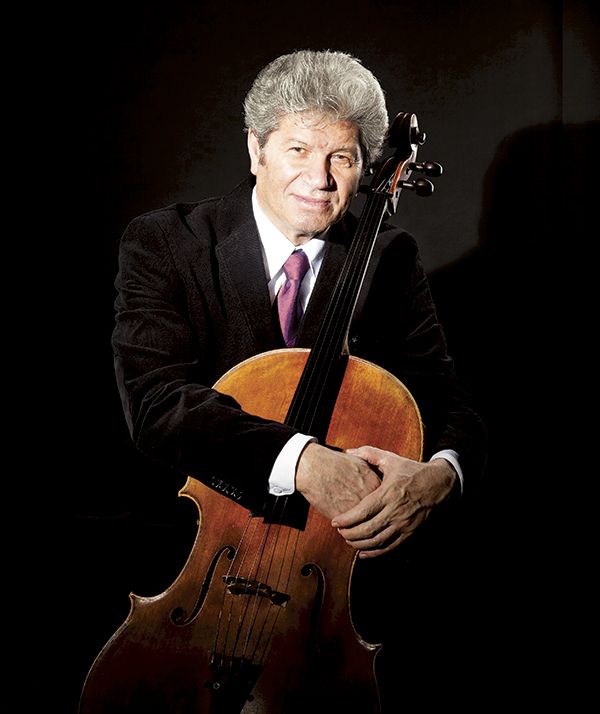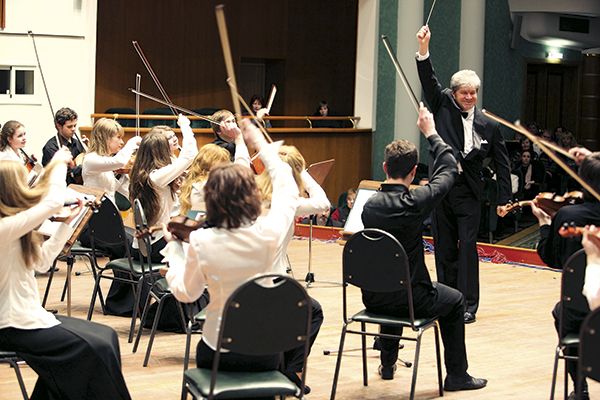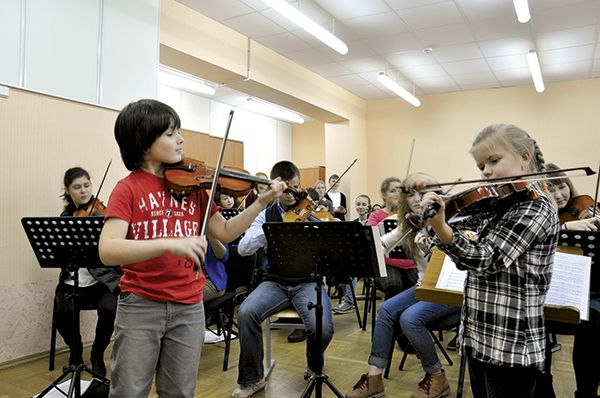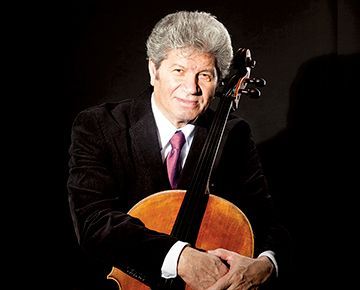
For the past five decades, he has aspired to teach his pupils to hear the heart of music. He has mentored well-known cellists, who now work and live around the globe, in such countries as Russia, France, Taiwan, Israel, Scotland and Germany.
Vladimir Perlin often states that he teaches as he himself would have liked to have been taught. He recites poetry and jokes to help his pupils understand musical subtleties. His talent is remarkable, inspiring his students to reach for the highest goals as members of an orchestra.
I once saw his young musicians on stage and was impressed by how relaxed they were during performance, and how very happy. They performed their parts with artistic flair, as if embodying the images created by their music. Their bodies and faces danced in time with the melody. All was stylish and smooth.
Experts often mention Mr. Perlin’s teaching methods, and journalists like to repeat his favourite phrase: ‘It’s not enough to take a bow in your hands. You must be able to produce sound as if you’re caressing the strings with love’. Of course, seeing once is better than hearing ten times. Accordingly, I went to the gymnasium-college of arts to see the maestro’s ‘style’; the best way to learn ‘kitchen’ secrets is in the kitchen.
Mr. Perlin was mid-rehearsal when I entered, his pupils practising for a concert of laureates, and scholarship holders from the Special Fund of the President of Belarus (marking the 20th anniversary of the Fund). The Belarusian University of Culture has a database of names of all those who have held scholarships, and Mr. Perlin and his pupils are well-known to its employees.
Komsomolskaya Pravda newspaper reported Mr. Perlin’s first trip abroad in the early 1990s, to West Germany, where he led his pupils in playing a small symphony by Vivaldi, near Cologne Cathedral. The owner of a small cafe nearby liked their performance so much that he treated them all with not only delicious ice-cream but dinner.
On entering, I saw Vladimir standing with arms raised, reciting poetry. He nodded at me, inviting me in. His pupils were listening with acute fascination, with mouths agape. Then, he waved his conductor’s baton, and the music began. However, he soon stopped them, being dissatisfied, saying, “You’re playing, instead of living! Where are your eyes? Why don’t I see excitement in your bodies?!”
He quoted some poetry, and joked, which brought laughter. I couldn’t help joining in, as his jokes were so well-timed. He told us about the war, which he witnessed first-hand. The first chords began again, and were already different, coming alive, full of feeling. I felt as if the music were transforming into visible images.
That day, during rehearsal, I also felt the music as an invisible yet perceptible substance, almost tangible, and able to touch the soul. I realised that this was the secret of music, as guessed by Vladimir Perlin. This is the magic he aspires to create.

Vladimir Sinkevich, the grandnephew of Vladimir Korotkevich [the well-known Belarusian writer] was a wonderful cellist, although there was a time when his parents considered ending his studies. However, after two years, he was ready to play at St. Roch’s Catholic Church. There are many such examples.
Mr. Perlin seems reluctant to end the rehearsal, or to stop to give me an interview. I understand why: he is still wrapped in his world of harmonies and musical images.
Vladimir, I’ve read often in the press about your hatred for the cello in your younger years and your love of sports. What happened for you to become not simply an outstanding performer and teacher, but a world-recognised musical genius?
As a child of war, I dreamt of becoming a tankman, a pilot, and a Hero of the Soviet Union, performing feats. I was a record-holder in Belarus for swimming, and a master of sports. I had no plans to connect my life with music. However, my mother (I will be always grateful to her) sent me to musical school for ten years, at the conservatory. In 1949, I learnt that she had done so in memory of her own father, who was the first director-founder of this institution in 1935 and the first teacher of the cello. My grandfather was burnt [by the Nazis during the war years], together with my grandmother, aged 39, in 1941.
My early years of study were very difficult, but things changed when a certain teacher appeared. He opened my eyes to music and the role it could play. Stagorsky Alexander Pavlovich was an outstanding cellist, teacher and professor. He was aged only 7 when the Revolution began, so did not manage to finish school in 1917. He ended up teaching himself and would always say that ‘those who did their job would always be in demand’.
To do all I must, I get up at 5am, and go to bed at midnight.
People call you the ‘best of the best’, having travelled the world, giving concerts and master classes, and having repeatedly played for British Queen Elizabeth.
It is utter nonsense to elevate your own opinion of yourself. We should show our worth not in word, but in deed, with our instruments. We can then give praise where it’s due. To ‘overpraise’ a person inflates their pride. I don’t ask to take part in concerts, or go on tour, or appear in articles or films. Others find me. I simply aspire to bring happiness and pleasure to those before whom I perform.
Do you think, love to art can be descended?
It’s currently fashionable to speak of art and talent passing down through genes, including love of the arts. Certainly, there is something in this theory. For example, my mother composed an opera at the age of 7, while my grandfather founded the conservatory. However, you need more than talent to win the hearts of an audience. Masterly playing does not win souls. You can only achieve this by allowing your own soul to tremble during your performance. You should inflame your soul! Then, your music will influence the souls of your audience.
Every day, I remind myself, and my pupils, of this fact. They need to understand this, so that their internal riches find reflection in their performance. When they lack knowledge, as happens often, I share my own experience with them; I teach them to open their hearts. I give examples from life and chat, asking somebody to sing a folk song. Sadly, they cannot, as they do not know how! Then, I recite Lermontov or Pushkin. I want children to understand that Lermontov and Pushkin are as important to learning the grand piano and cello as the teacher who instructs them on holding their hands correctly.
It is possible to play the same piece of music very differently. You’ve just heard how the sound changed when the children began to relax more; it’s what I call the magic touch! When children are being sincere, they find the best path of self-expression. The main thing is to arouse their emotions.
Can you teach anyone to play, even the ungifted…?
I can’t work alone. Remember the well-known triad of pupil, teacher and parent. I had one young pupil whose grandmother used to accompany him to lessons, and all was perfect. However, one day, an infuriated woman rushed in, while we were watching a TV recording, which I had to stop. She was the mother of the boy and didn’t like my methods, thinking that her son wasn’t being pushed hard enough. She saw him as a budding Mozart. Her attitude brought down the house of cards.
Training professionals to a high level is like growing a tree. It takes time for the apples to form: perhaps five years. You must water the sapling, add fertiliser, graft on extra branches and prune where needed. When I take on children, I always insist on meeting their father and mother, since much depends on parents. They should be my allies.
Are there any rules for teaching a child?
If musical talent is sent by God, then who knows how to cultivate it correctly? There are no rules. The main thing is to support children. I know what to say and when, how to joke and how to scold. We all have different temperaments; the important thing is to love what you do. I’m 74 but I still love coming to work; teaching children is my ‘air’. When I see their eyes shine, it brings such happiness. What an amazing influence the soul of a child exerts on us! If you have children, you’ll understand! They cure all maladies! I love my pupils, while they love me. You see it at once, when you come to my lessons. We shouldn’t offend or deceive a child; we should love and support them, while preparing them for a professional life. If you feed a child only with sugary flattery and false praise, what will he or she become? Of course, sometimes, I manage to unintentionally offend someone but then I feel great regret. I’m my own strictest judge. Once my inspiration ends, I’ll leave the college at once.

How do you select pupils for the college orchestra?
You saw how many students came to the rehearsal? I need just fifteen. Of course, it’s pleasant for me to know that they want to attend. Among them, I seek out the ‘idiots’, for whom music is everything! They want to give others a world of spiritual enrichment, making life purer, better, with fewer criminals and police. I need enthusiasts who work not for money but because they are driven by obsession. Such musicians will always be in demand, and will receive recognition. There are many such examples.
How do you recognise a child’s talent?
People refer to intuition. I am a physiognomist by nature. Even among those who would usually be expelled, I see their potential.
Why do classics ‘never die’?
Classical works shock us, bringing catharsis. Valentin Gaft [a well-known Russian theatre and cinema actor] wrote:
The bow touches your soul,
As soon as it touches the cello,
Or the violin,
Sacred instant — do not sin!
The soul pines for purity,
In that sound is the echo of our torment,
Art: who blows and how!
When there is such a String,
And there are Hands, and Inspiration,
There is music, and rescue therein,
There is Truth exposed,
Unspoilt by words,
And you want to love and live,
And to give everything, and to forgive.
Such things sometimes happen.
How can we make classics popular, so that young people can recall the composer of ‘The Four Seasons’ without prompting? Most seem to learn about the classics from adverts on television or the radio.
We need to discuss them more, and to write about them. We, musicians, can make the world better, at least indirectly, feeding the soul. A guardian angel will come and rescue us. I play with an open soul, and teach others this art. I want to play for pre-schoolers at our Young People’s Theatre. They would enjoy it! I’m sure! I can say without false modesty that it’s difficult to acquire tickets to my concerts as they are always sold out. People leave with tears in their eyes. Let’s speak more often about the miracle of music, and our world-class musicians.
What defines music as world-class?
Demand. You won’t be able to purchase a ticket to the Strauss Festival Orchestra in Vienna unless you book a ticket two years beforehand! Our college has trained a huge constellation of musicians who are in demand worldwide. For example, Ivan Karizna won the International Tchaikovsky Competition and, in 2010, reached the final of the classical Eurovision (Eurovision Young Musicians). This helped promote classical music. Andrey Ponochevny has gained numerous victories at various international musical competitions. Artem Shishkov is a laureate of fifteen international competitions, while Vladimir Sinkevich has won a competition in Korea, where no Slavic cellist has ever before won a prize. I could go on.
Do you regret anything in life?
Meeting my teacher, Alexander Stogorsky, too late; 17 years of my life were less fruitful than they could have been. I also regret that, for half of my life, I was a convinced atheist.
What changed your world-view? Does your faith help you to overcome everyday difficulties?
When I was 54, I had problems with my hand, and even faced amputation. Then, I heard about an old woman who used the power of prayer to help heal her injury. I decided that things couldn’t be worse so I visited her, and saw candles everywhere in her home. They were crackling! She asked, “My darling, do you believe in God? I help only those who believe. Look at the flame!”
I thought that she was playing a trick on me, yet I followed her advice. I went to the nearest church and was christened. I remember that I laughed inwardly while being baptised. The next day, I returned to her and the candles were no longer crackling! Then, many miracles began in my life. My hand was saved. Years after I’d decided to be christened, the church told me that there was no going back now and that my baptism set my path on Earth. However, thanks to my belief in God, I understood that being a believer and loving one’s neighbour aren’t shown in words but in deeds. This is the greatest feat we can achieve.
Belarus’ magazine reference
In 2003, the French Government awarded Vladimir Perlin the Ordre des Palmes Académiques (the Order of Academic Palms): the highest French order ever presented to a Belarusian. The Order of Academic Palms was instituted by Napoleon I in 1808 and is given to Frenchmen living abroad, and to foreign citizens who make a considerable contribution to promoting French culture worldwide.
Officers, knights and commanders of the ‘Academic Palms’ become members of the Association of Members of the Order of Academic Palms, which is under the aegis of the Minister of Education of France. Vladimir Perlin was awarded as an ‘unsurpassed master not only for his proficiency of technique and his art of playing the cello, but in gratitude for his pedagogical talents’.
For many years, under the initiative of Vladimir Perlin, cellist Jerome Pernoo, and pianist Jerome Ducros, the Minsk College has been successfully liaising with the Conservatory of the 19th Arrondissement of Paris and France’s National Higher Conservatory of Music and Dance.
By Alisa Krasovskaya












